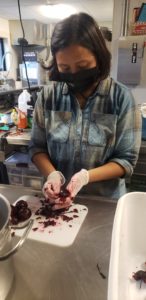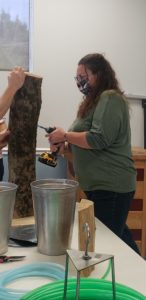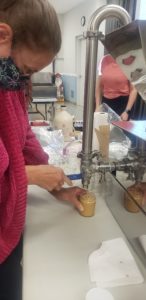Farm Ops Expanding to Reach Military Veterans
The Cornell Small Farms Program’s veterans in agriculture project is working with local Cornell Cooperative Extensions to in-person workshops.

Air Force veteran Nora Ling-Browning processes beets for pickling.
Image provided
For the first time since March 2020, when the COVID pandemic swept across NYS, the Cornell Small Farms Program’s Farm Ops project brought military veterans together for three in-person workshops beginning in October 2021. Although still having to follow COVID-19 mitigation protocols, these in-person events gave veterans an opportunity to connect and learn together.
“I prefer in-person events and to learn from other people’s experiences.”, stated veteran Ralph Felter. “Plus you get to meet other veterans, who are subject matter experts.”
The first workshop took place on Rich Taber’s farm. Rich Taber, an Army Veteran and longtime farmer, works as a Cornell Cooperative Extension (CCE) grazing, forestry, and animal science educator. Topics that day consisted of reclaiming old fields using brush hogs, native seedbanks, fertility inputs, and principles of regenerative agriculture to inexpensively provide lush, nourishing pastures for livestock. The workshop included lunch and a guided tour of Rich’s farm to show how the theories of grazing have been applied to this cold, high elevation property.
Broome CCE’s Agricultural Economic Development Specialist, Laura Biasillo, hosted two veteran workshops last fall. The first workshop, Maple Syrup for Beginners and Maple Confections, included tree identification, tree health, tapping, sap collection and handling, boiling, energy efficiency, finishing and grading syrup, canning, marketing, and regulations. The afternoon focused on the production of maple confections and featured training and hands-on demonstrations of making maple granulated sugar, molded maple sugar, crystal coating and maple cream.
The last fall workshop focused on different food preservation techniques, including dehydration and hot water bath canning. Veteran participants also learned basic food safety principles to set up for success in the kitchen. Veterans made jerky and pickles in addition to a fresh salsa.

Army veterans and mother/daughter, Kathy Merrial (left) and Carolline Greene (right), practice using tool in the Maple Syrup industry.
Image provided

Army veterans and mother/daughter, Kathy Merrial (left) and Carolline Greene (right), practice using tool in the Maple Syrup industry.
Image provided
“I had a great time and learned a lot of best practices that I will implement when I start canning/preserving our harvest”, stated Air Force Veteran, Nora Ling-Browning. “I met a lot of other veterans, including the ones that attended Armed to Farm, and felt the camaraderie that I had sorely missed that could only be found while serving in the military. I look forward to attending future classes to learn more about gardening, farming, and any other best practices that we can implement on our farm and for our livelihood.“
Nina Saeli, Farm Ops Project Associate agrees with Ling-Browning that learning to preserve food is important to a farmer’s livelihood.
“I think workshops like this are important to veterans because many veterans are interested in being self-sufficient and being able to preserve your harvest for winter use is a huge part of self-sufficiency,” Saeli said.
Learn more about the Farm Ops project on the Cornell Small Farms Program website.

